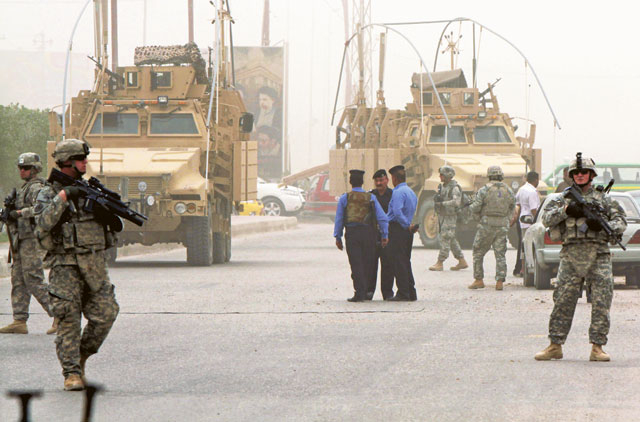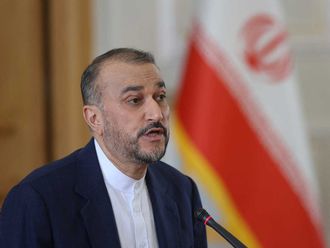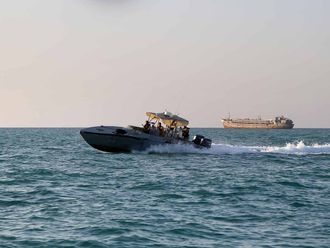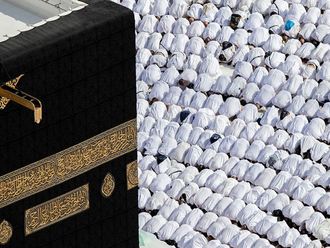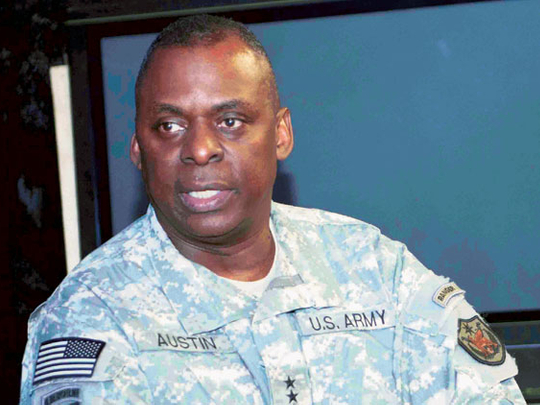
Dubai: Any decision to keep American troops in Iraq beyond 2011 can be considered only after a request by the government of Iraq and negotiations with US policy-makers. To date, however, the US has received no such request from the Iraqi government, the commander of the American forces in Iraq says.
In an exclusive interview with Gulf News, General Lloyd James Austin III, commanding general of US forces in Iraq, stresses that an extended troop presence would be a major course correction in the plan the US is executing — a plan aimed at complete troop withdrawal by December 31.
In light of the Iraqi government cancelling a contract to buy F-16 fighter aircraft from the US, the general believes that without such aircraft, Iraq will not have an inherent capability to defend its skies beyond 2011 and the Iraqi leaders recognise that fact. However, budgetary constraints forced the government to commit resources to provide for the basic needs of the Iraqi people in lieu of purchasing the planes.
The other pressing question is the infiltration of Iraqi forces by Iran- backed militias. General Austin III admits there are several extremist groups operating differently, but the common thread is that they all target US forces.
Some of these groups are funded and equipped with rockets and EFPs (Explosively formed penetrators) by Iran. Their actions, General Austin III reiterates not only harm US forces, but often injure and kill Iraqi citizens.
They are targeting US forces now he says, but it is likely they will target the government of Iraq once US troops are gone.
General Austin III is clear that the US supports a normal relationship between Iraq and Iran — one that does not involve support of lethal action inside of Iraq. In this interview, he talks about the American military strategy in Iraq and the outlook for the country's security situation.
Gulf News: Has the lack of permanent security ministers in Iraq slowed negotiations on some critical issues, like plans to continue training the Iraqi police and to establish an office to sell military equipment to the Iraqis?
General Lloyd James Austin III: Yes, in our role to advise, train, assist and equip the Iraqi security forces (ISF), we have seen a number of areas where the absence of permanent ministers has slowed things down. The ministers of defence and interior are strategic leaders who counsel the prime minister and are the critical links between national-level leaders and operational leaders in the ISF. Without them, it is much more difficult to obtain decisions that impact the allocation of resources in the ministries and set policies that chart the way ahead. Therefore, it is important to fill these positions with qualified candidates as quickly as possible so the new ministers can focus on issues related to security and ISF development. Security is the foundation upon which Iraq will build its future prosperity.
Military analysts and some politicians in both the US and Iraq argue that a complete withdrawal of troops could threaten Iraq's tenuous stability and squander any advantage won by the US through the deaths of thousands of servicemen and in the billions of dollars spent.
This region has always been dynamic, even more so recently. The operational environment changes rapidly and the future balance of power and stability is uncertain. Our goal has been to develop an enduring, strategic partnership with a sovereign, stable, and self-reliant Iraq that contributes to the peace and security of the region.
The ISF have come a long way since 2003 — growing from zero to more than 650,000 personnel, adding equipment, and increasing capability. They are one of the fastest developing forces in the world and they are doing it all while fighting a determined enemy.
The ISF have been in the lead for internal security for some time and have done a good job — they are approaching the ability to handle it on their own. However, Iraq's ability to defend its borders and airspace will not be fully developed by the end of 2011.
We will continue to advise, train, assist and equip the ISF to add as much capability as we can. Iraq's leaders recognise that capability gaps will remain and it is up to them to decide if they need our assistance in closing those gaps.
The nature of our relationship beyond 2012 will be determined by the Iraqi and US governments. Regardless of any troop presence, America will remain Iraq's partner through our US Mission led by the Embassy in Baghdad and supported by its consulates throughout the country.
There are reports that both Ambassador James F. Jeffrey and you have been soliciting advice on creative ways the US could keep soldiers in Iraq.
I am not soliciting advice on ways to keep US troops in Iraq. Ambassador Jeffrey and I do, however, meet with Iraqi leaders on a regular basis to discuss the many critical issues Iraq faces in security, economic growth, and democratic governance.
Any decision to keep US troops in Iraq beyond 2011 would have to start with a request from the government of Iraq and negotiations with our civilian policy-makers. To date, we have no such request. An extended troop presence would be a major course correction to the plan we are executing, which takes us to zero troops by December 31, 2011.
If the Iraqi government want to request continued US military assistance, the sooner they ask the better.
Why was the F-16 contract between the US and Iraq cancelled? Do the Kurds and Iran have anything to do with that decision?
Iraqi leaders expressed a strong desire to acquire F-16s. Iraq leaders recognised that the F-16 is the best multi-role fighter aircraft available, one which many of its neighbours have. However, due to budgetary constraints, the government of Iraq decided to commit resources to provide for the basic needs of the Iraqi people in lieu of purchasing the planes at this time.
Without fighter aircraft, Iraq will not have an inherent capability to defend its skies beyond 2011 and Iraqi leaders recognise this fact.
What about Iraqi pilots being trained in the US. Will the programme continue?
We're hopeful that the programmes will continue. Iraqi pilots are enrolled in several training programmes in the US. These programmes are instrumental in helping Iraq develop professional pilots that can build an integrated air defence strategy.
The programmes also foster strong military-to-military relationships between the US and Iraq.
What about the Sahwa (Sons of Iraq) in Ramadi, Baghdad, and Tikrit? Has their role ended with the major drop in Al Qaida in Iraq operations in Iraq? What is your assessment of AQI's capabilities in Iraq?
Since 2007, the Sahwa have played a significant role in helping to create the relative security that Iraqis have today. The government of Iraq has demonstrated its commitment to the group by transitioning approximately 40,000 members to permanent employment, providing support to the families of those members killed in the line of duty, and paying them in a timely manner.
There has been a lull in transitions since the government and ISF leaders determined that the Sahwa were needed during the elections in March and the delay in forming the government. I am hopeful the government will keep its promise to incorporate the remaining Sahwa into meaningful jobs based on their qualifications.
As for the AQI, it is fractured and degraded, but determined. The ISF, with US assistance in counter-terrorism operations, have had an impact on the AQI's network and its ability to finance itself. Together we have brought a number of AQI's junior and mid-level leaders to justice. However, they continue to have the ability to regenerate their leadership and, as we saw recently in Tikrit, AQI is still capable of carrying out attacks designed to garner media attention and discredit the GOI and ISF.
They are one of the most dangerous threats to Iraq's stability and the ISF must continue to apply pressure on their networks. In my opinion, if left unchecked, the AQI will not only continue to kill innocent Iraqis, but export its terror to other parts of the world.
With regard to the demonstrations in Iraq, many observers believe that the US is sponsoring the political democratic process in the country. What is your take regarding the way the government and Iraqi forces dealt with the demonstrations?
The US, along with our coalition partners, has been instrumental in establishing the democracy that Iraqis enjoy today. We support the Iraqis' right to peaceful freedom of expression but are not promoting demonstrations.
On February 25 there were approximately 49 demonstrations throughout Iraq involving more than 27,000 Iraqis. Most of the demonstrations were peaceful but a few turned violent and use of force by the ISF led to some loss of life. There have been demonstrations every week since then, all of which have been peaceful.
Overall, the ISF have demonstrated their professionalism and performed well given the challenge of keeping demonstrations orderly while protecting participants from potential extremist threats. They have taken the time to internally review their performance and take steps to improve their ability to respond to demonstrations.
Iraqi Prime Minister Nouri Al Maliki issued a directive against the use of unnecessary force and we welcome the Iraqi government's decision to investigate alleged incidents of excessive force by the ISF as well as unwarranted detentions.
Our hope is that any future demonstrations are peaceful and serve as a positive catalyst for government progress.
Reports suggest Iraqi forces are being infiltrated by Iran-backed militias through what is termed as ‘demi-integrated officers'. Do you believe Iran will use Iraq as a launching pad against any future targets in the event that US troops withdraw?
There are several different extremist groups and each of them operates differently, but the common thread is that they all target US forces. Some are funded and equipped with rockets and EFPs by Iran. Their actions not only harm US forces, but often injure and kill Iraqi citizens as we have seen with many of their rocket attacks.
They are targeting US forces now, but it is likely they will target the government of Iraq once our troops are gone. That said, Iraq will never allow another country to determine its future.
Iraq deserves responsible neighbours who respect its sovereignty and who build positive relationships through trade and diplomatic means.
We support a normal relationship between Iraq and Iran — one that does not involve support of lethal action inside of Iraq.
The Peshmerga forces are stationed in the oil-rich governorate of Kirkuk as we speak, and after talking with senior Kurdish officials, we understand that they have no near plans for withdrawal. What is the stand of the US forces on this issue?
All Peshmerga forces have left Kirkuk. US, Iraqi government and KRG (Kurdistan Regional Government) leaders have worked together to resolve the recent situation peacefully through dialogue.
The only lasting solution in Kirkuk and other disputed internal boundary areas is a negotiated political solution. There is no long-term military solution.
Regulatory authorities, the central bank and other vital bodies in Iraq, which are supposed to hold Al Maliki and his government accountable for its deeds, are all under him today. How do you feel about this?
This is a Constitutional issue for the Iraqi people, their courts and their elected representatives to resolve. In that regard, it is heartening to note that, after significant public discussion of the issue, in early March, the Chief Justice of the Iraqi Supreme Court and the Speaker of the Council of Representatives met, discussed the issues, and jointly expressed support for the January 18, 2011 decision.
At that time, the Federal Supreme Court issued a partial clarification reiterating the independence of such commissions in their decisions and procedures, and linking executive oversight of executive functions explicitly to constitutional provisions.
While this situation remains dynamic, the response to the decision illustrates the important safeguards, checks and balances in the Iraqi legal system and suggests that system is maturing while responding to public concerns.
Profile - A veteran of American military operations
- On June 30, 2010, General Lloyd James Austin III was confirmed by the Senate to replace Lieutenant General Raymond T. Odierno as commander of the American forces in Iraq.
- General Austin III, presently the Commanding General of US Forces in Iraq, graduated from the United States Military Academy (West Point) with a Bachelor of Science degree in June 1975. He also earned a Master's Degree in Education from Auburn University, and a Master's Degree in Business Management from Webster University. He is a graduate of the Infantry Officer Basic and Advanced courses, the US Army Command and General Staff College, and the US Army War College.
- After a lengthy military career which saw him serving in Germany, Afghanistan and holding senior army posts inside the US, General Austin III became the second highest ranking commander in Iraq. In 2008, he took the command of the Multi-National Corps-Iraq (MNC-I), replacing Lieutenant General Odierno.
- As commander of MNC-I, he directs the operations of approximately 152,000 joint and coalition forces in all sectors of Iraq.
- On September 1, 2010, General Austin III was officially appointed Commanding General of US forces Iraq. At a ceremony presided by US Vice-President Joe Biden, Defence Secretary Robert Gates, and Joint Chiefs Chairman Admiral Mike Mullen at the Al Faw palace in Bagdad, Iraq, General Austin III took over from Lieutenant General Odierno.


